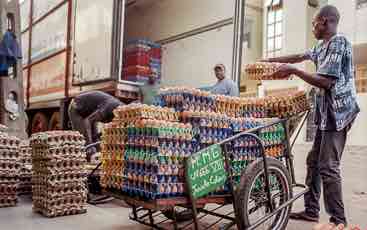Rapid urbanization and income growth are driving shifts in the diets of urban consumers in low-income countries in Africa and South Asia from inexpensive staple cereals to higher-value products such as fruits, vegetables, and animal-sourced foods. While the current disruption to incomes and supply chains from the COVID-19 pandemic may slow these developments and threaten food security in the near term, the longer-term demographic trends and related demand changes will provide important opportunities for agricultural development and reducing rural poverty.
As Chapter 2 of IFPRI’s 2020 Global Food Policy Report outlines, meeting these challenges and changing demands, and capitalizing on the opportunities they bring, will depend on agrifood system transformation. Yet some of the required adjustments will pose significant barriers to smallholder farmers, who often lack both the means to invest in growth and access to markets. In order to leverage the potential of food systems to improve the livelihoods of smallholders and rural workers, policies will need to promote nonfarm job and income generation through development of the “hidden middle” of agrifood supply chains; and improve farm productivity and incomes by connecting smallholders to markets.
The “hidden middle”
Achieving inclusive agrifood transformation may ultimately hinge on the “hidden middle” of the food supply chain, now dominated by millions of small and medium-sized enterprises (SMEs) in transportation, processing, and distribution. Largely overlooked so far, this so-called quiet revolution presents an opportunity for researchers and policy makers. Recent evidence shows that with better access to improved infrastructure and credit, SMEs can thrive and become instrumental in connecting farmers to markets. This, in turn, will integrate smallholders into the agrifood value chain and increase their market access.
In both Africa and lower-income Asia, 25% of overall rural employment already comes from the midstream of food supply chains. Moreover, household survey data from African countries shows that income from rural nonfarm agrifood enterprises is more than double the income derived from farm activity. To effectively tap into this potential, policies must focus on providing adequate infrastructure, proper market incentives, and skills development, and on encouraging inclusion of smallholders in agrifood supply chains by securing land tenure, promoting inclusive agribusiness models, and stimulating digital technology use.
Policies for inclusive transformation
As urban diets transition to higher-value products that are processed or require special handling such as cold storage, adequate infrastructure (including roads, consistent electricity and storage facilities) becomes increasingly important. Policies should therefore promote investment in rural infrastructure so that small farmers and nonfarm workers can produce and deliver their products to market. Research shows that infrastructure investment has the most impact on market access when it also promotes connectivity. Information and communication technologies allow farmers to communicate with other actors in the value chain, access reliable information, and negotiate better farmgate prices, among other benefits. Given all this, communication services for rural areas should also be a priority.
Well-designed and targeted price policies, meanwhile, can have important impacts all along the value chain: Adequate price incentives are important to help small farmers capture a greater share of food system value-added; price policies that keep electricity costs affordable and consistent are critical for processing and distributing operations; and lower tariffs on imported equipment (prevalent in Africa and South Asia) will help to rapidly develop the food supply chain and create jobs. Furthermore, due to increasing food safety concerns, supermarkets and large processers have raised food quality and safety standards. Policies that help small farmers meet these standards and regulations—for example, provision of financial assistance to meet initial requirements—can improve market access while making food systems more inclusive.
Besides physical resources, education and entrepreneurship training are invaluable, as they empower rural communities to access better-paid jobs in nonfarm employment. Training in general skills (i.e., running a business) and technical skills (i.e., food safety, processing techniques) is essential to develop a labor force that can raise productivity and strengthen the food value chain. Vocational training, basic education programs, and building awareness of job opportunities and labor rights will also increase employability among rural youth, benefiting rural communities overall.
Policies that strengthen land tenure and encourage inclusive agribusiness models are both key. Secure land tenure can help stimulate agricultural development by increasing farmers’ access to credit and inputs and enabling the development of land and rental markets. These markets give small farmers access to larger plots that help them achieve economies of scale. Secure land tenure also supports the development of rental markets for equipment such as tractors and use of improved seeds and other inputs.
Producer organizations can also help smallholders overcome economic constraints to economies of scale and strengthen their access to markets. Such organizations allow small farmers to share risks, increase their bargaining power, and reduce transaction costs. They also facilitate smallholders’ access to credit by managing microcredit systems and indirectly via innovative arrangements for obtaining short-term loans, for example.
Urbanization, income growth, and changing dietary patterns have given rise to the development of well-integrated networks of downstream activity and new requirements for high-value-added food items, food quality, and food safety. With these changes come not only challenges but also opportunities to create jobs, raise incomes, and improve smallholder livelihoods in rural communities in Africa and South Asia. Policies should guide the transformation process in a way that ensures that economic benefits from the growing agrifood sector are shared fairly among all value chain actors. This can best be done with a food system approach and will necessarily require some trade-offs. To design policies that effectively balance such trade-offs, however, policy makers will need more and better data on the food system beyond the farm. This will reveal what is now often considered the “hidden middle” Hence, if governments invest in improved data gathering, researchers and policy makers will have a far better chance of crafting policies that strengthen the entire food value chain to the benefit of all.
Rob Vos is the Director of IFPRI’s Markets, Trade, and Institutions Division; Khiem Nguyen is an IFPRI Communications Intern.







